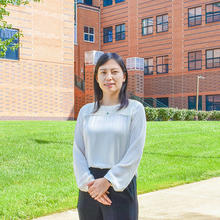- November 21, 2024
We know from prior research that savvy investors respond to ESG data. But a pair of finance professors have discovered perhaps the most lucrative wrinkle in this strategy.
- October 22, 2024
Under the supervision of Costello professor Derek Horstmeyer, student-driven research insights are raising eyebrows among employers—and readers of major newspapers.
- August 16, 2024
Fake trades engineered to juice an exchange’s numbers have been a part of bitcoin exchanges since the beginning, finds a George Mason finance prof.
- August 8, 2024
In churchgoing counties, financial advisors are more likely to remember their ethical training and resist the temptation to misbehave.
- July 22, 2024
You can tell a lot about a hedge fund’s quality—and long-term performance—from the market climate in which it was launched.
Lin Sun, assistant professor of finance, recently published a paper in Review of Finance that compares hedge funds formed in high-demand, or “hot,” markets to those produced in a “cold” market climate. - April 18, 2024
Bo Hu, an assistant professor of finance at Mason, is developing new research methods to better capture the intricate, interlinked dynamics of financial markets.
- April 16, 2024
Like financial markets, the creative industries are driven to seek equilibrium, which may be good news for both human content creators and their algorithmic adversaries. Jiasun Li, an associate professor of finance, is researching this in a new working paper.
- February 22, 2024
Jiasun Li, an associate professor of finance at the Costello College of Business, has received a prestigious CAREER award from the National Science Foundation. According to the NSF website, the CAREER award is given to “early-career faculty who have the potential to serve as academic role models in research and education and to lead advances in the mission of their department or organization.”
- February 6, 2024
Mason finance professor Lei Gao, finds a “precautionary effect” at work in the minds of Republican-supporting CEOs, leading to more frequent and accurate earnings forecasts.
- December 6, 2023
What if you could outsource any computing task to the crowd without risking an epic fail? A newly developed set of technological tools could make this a reality.







